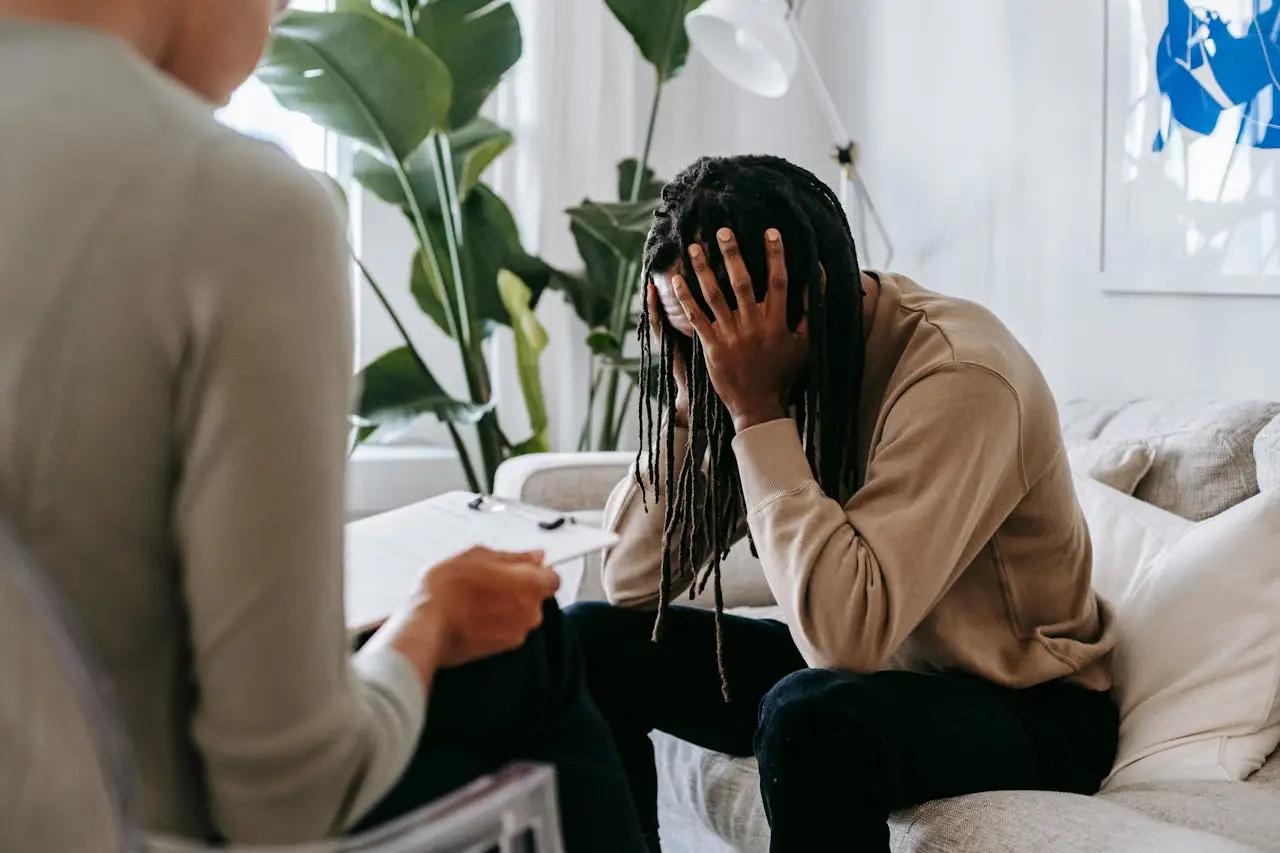What is an Anxiety Disorder?
Anxiety is a natural response to stress or danger, characterized by feelings of worry, nervousness, or fear. It becomes a disorder when these feelings are excessive, persistent, and interfere with daily life. There are several types of anxiety disorders, including (but not limited to):
- Generalized Anxiety Disorder (GAD): Excessive, uncontrollable worry about a variety of topics.
- Panic Disorder: Recurrent, unexpected panic attacks and fear of future attacks.
- Social Anxiety Disorder / Social Phobia: Intense fear of social situations and being judged by others.
- Specific Phobias: Irrational fear of specific objects or situations.
- Obsessive-Compulsive Disorder (OCD): Intrusive thoughts (obsessions) and repetitive behaviors (compulsions).
- Post-Traumatic Stress Disorder (PTSD): Anxiety following a traumatic event.
- Selective Mutism: Anxiety disorder in which a person, typically a child, is unable to speak in certain social situations despite being able to speak comfortably in others, such as at home.
- Separation Anxiety Disorder: Excessive fear or anxiety about being separated from attachment figures, typically occurring in children but also sometimes affecting adults.
How Can I Manage My Anxiety?
Managing anxiety involves a combination of self-help strategies, lifestyle changes, and professional treatment. Here are some effective everyday ways to manage anxiety (often in combination with help from a professional counselor):
1. Practice Deep Breathing
- Techniques: Use diaphragmatic breathing, where you breathe deeply into your belly rather than your chest.
- Exercise: Try the 4-7-8 technique—inhale for 4 seconds, hold for 7 seconds, and exhale for 8 seconds.
2. Engage in Regular Physical Activity
- Benefits: Exercise can reduce anxiety by releasing endorphins and improving sleep.
- Types: Include activities like walking, jogging, swimming, or yoga.
3. Maintain a Healthy Diet
- Nutrition: Eat a balanced diet with plenty of fruits, vegetables, whole grains, and lean proteins.
- Avoid: Reduce caffeine and sugar intake, as they can increase anxiety.
4. Get Adequate Sleep
- Routine: Maintain a consistent sleep schedule, going to bed and waking up at the same time each day.
- Environment: Create a restful sleep environment—dark, quiet, and cool.
5. Practice Mindfulness and Meditation
- Mindfulness: Focus on the present moment without judgment.
- Meditation: Use guided meditation apps or practice mindfulness meditation to reduce anxiety.
6. Set Realistic Goals
- Prioritize: Break tasks into smaller, manageable steps and set achievable goals.
- Focus: Concentrate on what you can control and take things one step at a time.
7. Develop a Support System
- Connect: Talk to friends, family, or join support groups.
- Share: Discussing your feelings and experiences can help reduce anxiety.
8. Practice Relaxation Techniques
- Techniques: Try progressive muscle relaxation, where you tense and then relax different muscle groups. Practice relaxation techniques such as yoga or tai chi.
- Activities: Engage in activities that you find relaxing, such as reading, listening to music, or taking a bath.
9. Limit Alcohol and Avoid Drugs
- Impact: Alcohol and drugs can exacerbate anxiety and interfere with medication effectiveness.
- Alternatives: Find healthier ways to cope, such as exercise or hobbies.
10. Stay Organized
- Planning: Use planners or digital tools to keep track of tasks and deadlines.
- Declutter: Organize your physical space to reduce stress and improve focus.
11. Challenge Negative Thoughts
- Cognitive Techniques: Practice cognitive restructuring to identify and challenge irrational or negative thoughts.
- Reframe: Replace negative thoughts with more realistic, positive ones.
12. Engage in Hobbies and Interests
- Activities: Pursue hobbies and activities that bring you joy and relaxation.
- Creativity: Engage in creative activities like drawing, writing, or playing an instrument.
What Kind of Professional Help is Available?
In addition to the above self-help tips and lifestyle changes, anxiety can be effectively treated with professional help. Several therapeutic approaches have been shown to be effective in treating anxiety disorders. Here are some of the most commonly used and well-supported therapy approaches:
1. Cognitive-Behavioral Therapy (CBT)
- Description: CBT focuses on identifying and changing negative thought patterns and behaviors that contribute to anxiety.
- Techniques: Includes cognitive restructuring, exposure therapy, talk therapy, and skill-building for coping strategies.
- Effectiveness: CBT is considered the gold standard for treating many types of anxiety disorders, including GAD, panic disorder, and social anxiety disorder.
2. Exposure Therapy
- Description: A form of CBT that involves gradual exposure to feared situations or objects to reduce avoidance behaviors and anxiety responses.
- Techniques: Can include in vivo exposure (real-life), imaginal exposure (visualizing), and interoceptive exposure (physical sensations).
- Effectiveness: Particularly effective for phobias, PTSD, and panic disorder.
3. Acceptance and Commitment Therapy (ACT)
- Description: ACT focuses on accepting negative thoughts and feelings rather than trying to change them, and committing to actions aligned with personal values.
- Techniques: Includes mindfulness practices, cognitive defusion, and values-based action.
- Effectiveness: Effective for a range of anxiety disorders and often used when traditional CBT is less effective.
4. Mindfulness-Based Stress Reduction (MBSR)
- Description: MBSR involves mindfulness meditation and yoga to increase awareness and acceptance of the present moment.
- Techniques: Includes body scan meditation, mindfulness meditation, and mindful movement.
- Effectiveness: Helps reduce symptoms of anxiety and improve overall well-being.
5. Dialectical Behavior Therapy (DBT)
- Description: Originally developed for borderline personality disorder, DBT is also effective for anxiety. It combines CBT with mindfulness and acceptance strategies.
- Techniques: Includes distress tolerance, emotion regulation, interpersonal effectiveness, and mindfulness.
- Effectiveness: Useful for anxiety disorders that co-occur with other conditions such as emotional dysregulation.
6. Eye Movement Desensitization and Reprocessing (EMDR)
- Description: EMDR is a therapy that uses guided eye movements to help process and reduce the impact of traumatic memories.
- Techniques: Involves recalling distressing events while focusing on an external stimulus, such as the therapist’s finger moving side to side.
- Effectiveness: Particularly effective for PTSD but can also help with other anxiety disorders.
7. Psychodynamic Therapy
- Description: Focuses on exploring unconscious processes and how past experiences, especially childhood, affect current behavior and emotions.
- Techniques: Includes free association, dream analysis, and exploring transference and countertransference.
- Effectiveness: Can be helpful for individuals who want to explore the root causes of their anxiety.
8. Interpersonal Therapy (IPT)
- Description: Focuses on improving interpersonal relationships and communication patterns that may contribute to anxiety.
- Techniques: Includes identifying problematic relationships, improving communication skills, and developing social support.
- Effectiveness: Particularly effective for social anxiety disorder and anxiety related to relationship issues.
9. Solution-Focused Brief Therapy (SFBT)
- Description: A goal-directed therapy that focuses on solutions rather than problems.
- Techniques: Includes identifying strengths, setting goals, and developing strategies to achieve those goals.
- Effectiveness: Useful for individuals who want to quickly identify and implement effective coping strategies.
10. Group Therapy
- Description: Involves meeting with a therapist and a group of individuals who share similar issues.
- Techniques: Includes sharing experiences, receiving feedback, and learning from others in a supportive environment.
- Effectiveness: Can provide social support and reduce feelings of isolation often associated with anxiety.
Additional Benefits of Therapy
- Skill Development: Therapy provides practical skills and techniques for managing the feeling of anxiety.
- Support and Validation: Therapy offers a safe space to express feelings and receive support.
- Increased Self-Awareness: Therapy helps individuals understand their anxiety triggers and patterns.
- Improved Coping Mechanisms: Therapy teaches healthy ways to cope with stress and anxiety.
Can Medication be Helpful in Managing My Anxiety?
Medication can also be helpful in managing anxiety disorders. Medications are often used in conjunction with therapy to provide comprehensive treatment. Some of the main types of medications commonly prescribed for anxiety disorders include:
1. Selective Serotonin Reuptake Inhibitors (SSRIs)
- Description: SSRIs are a class of antidepressants that increase the level of serotonin in the brain.
- Common Medications: Fluoxetine (Prozac), sertraline (Zoloft), escitalopram (Lexapro), paroxetine (Paxil), citalopram (Celexa).
- Benefits: Effective for a wide range of anxiety disorders, including GAD, panic disorder, social anxiety disorder, and OCD.
- Side Effects: May include nausea, headache, sleep disturbances, sexual dysfunction, and weight gain.
2. Serotonin-Norepinephrine Reuptake Inhibitors (SNRIs)
- Description: SNRIs increase the levels of both serotonin and norepinephrine in the brain.
- Common Medications: Venlafaxine (Effexor), duloxetine (Cymbalta).
- Benefits: Effective for GAD, panic disorder, and social anxiety disorder.
- Side Effects: May include nausea, dry mouth, dizziness, sweating, and sexual dysfunction.
3. Benzodiazepines
- Description: Benzodiazepines are sedatives that work quickly to reduce anxiety by enhancing the effect of the neurotransmitter GABA.
- Common Medications: Alprazolam (Xanax), diazepam (Valium), lorazepam (Ativan), clonazepam (Klonopin).
- Benefits: Effective for short-term relief of severe anxiety and panic attacks.
- Side Effects: May include drowsiness, dizziness, confusion, and dependence. Typically not recommended for long-term use due to the risk of dependence and tolerance.
4. Beta-Blockers
- Description: Beta-blockers reduce the physical symptoms of anxiety, such as rapid heartbeat and trembling, by blocking the effects of adrenaline.
- Common Medications: Propranolol (Inderal), atenolol (Tenormin).
- Benefits: Useful for situational anxiety, such as performance anxiety or social anxiety.
- Side Effects: May include fatigue, cold hands, dizziness, and, in some cases, shortness of breath.
5. Buspirone
- Description: Buspirone is an anti-anxiety medication that affects serotonin and dopamine receptors.
- Benefits: Effective for GAD. Less sedating than benzodiazepines and has a lower risk of dependence.
- Side Effects: May include dizziness, headaches, nausea, and nervousness.
6. Tricyclic Antidepressants (TCAs)
- Description: TCAs are an older class of antidepressants that affect various neurotransmitters in the brain.
- Common Medications: Imipramine (Tofranil), clomipramine (Anafranil).
- Benefits: Effective for panic disorder, GAD, and OCD.
- Side Effects: May include dry mouth, constipation, urinary retention, blurred vision, weight gain, and heart rhythm disturbances.
Choosing the Right Medication
The choice of medication depends on several factors, including the type of anxiety disorder, the severity of symptoms, any co-occurring mental health conditions, and the individual’s overall health and response to treatment. A healthcare provider, typically a psychiatrist or psychiatric nurse practitioner, will collaboratively work with you to determine the most appropriate medication and dosage.
Monitoring and Adjustments
- Regular Monitoring: It’s important to have regular follow-ups with the healthcare provider to monitor the effectiveness and side effects of the medication.
- Adjustments: Dosages may need to be adjusted, or different medications may need to be tried to find the most effective treatment with the fewest side effects.
Combining Medication with Therapy
For many individuals, combining medication with therapy (including any of the therapeutic approaches described above) provides the best outcomes. Medications can help manage the symptoms of anxiety, making it easier to engage in and benefit from therapeutic interventions. Thus, while medication can be a valuable tool in managing anxiety disorders, it should be used as part of a comprehensive treatment plan tailored to your needs.
Conclusion:
Remember, managing anxiety is a process that often requires a combination of lifestyle strategies and therapeutic approaches like the ones described in this article. However, each person is different with different histories, physiology, and needs. Thus, it’s important to seek professional help and find what works best for you.
If you’d like more information about counseling, psychiatric evaluation, or medication management or would like to set up services with one of our counselors, then reach out to us at https://cif.institute/contact/ or call us at (515) 620-3192 to make an appointment.




0 Comments